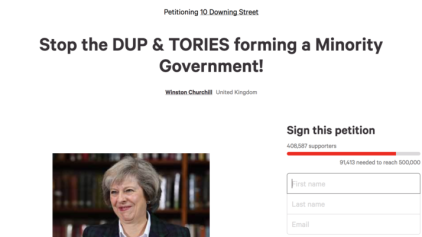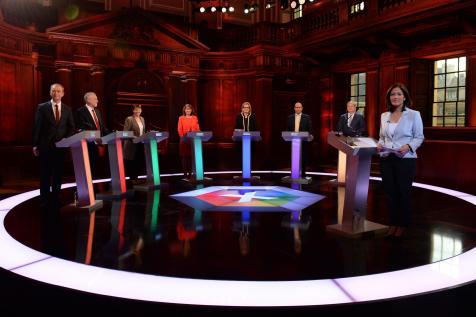
Nope, I don’t agree with this. Of course everybody should be free to express their opposition to the government. But the D.U.P and the Tories have been democratically elected, fair and square. We can’t simply launch a petition simply because we don’t like the look or the history of our newly formed government. I don’t particularly like the D.U.P, their social attitudes (Anti-LGBT, Anti-abortion and xenophobia) could prevent any progressive legislation being passed and their economic attitudes (unwavering support for big corporations and neoliberal markets) are a hindrance towards economic justice. But we should be challenging the political system that allows these parties to develop (First Past The Post, etc). Attacking those who benefit from the system only scratches at the surface of the problem.
If there is one thing to learn from this election, its to respect the political identity of the entire United Kingdom, and not just Scotland and England. The reporting of the General Election was concentrated in a very British fashion with no mention of any the Irish Parties. Every televised debate only included representatives from Welsh, Scottish and English parties. Of course, Corbyn’s recent electoral success is good for progressive politics. But, – and without trying to sound preachy – both media and the public have a political responsibility to ensure that ALL parts of the UK are included in our national conversation. We need to stop treating Northern Ireland as just an irrelevant offshoot from our society and to start respecting it a political equal.

Why don’t we have any Irish representatives on our national General Election debates?
[…] When I initially wrote about Irish politics painfully reinserting itself in to the Anglo-sphere, this is sort of what I meant. The General Election and Brexit have acted as a sharp reminder that Irish politics must be acknowledged, respected, treated in a way that not only preserves the prosperity of the United Kingdom but also maintains the precious diplomacy between Northern Ireland and the Republic of Ireland. This has been one of the most pressing and difficult matters for British and Irish politicians of the past 200-300 years and it is of no surprise that it is its rearing ugly head again. My old history lecturer used to say “if you want to know what was happening in Britain at a particular time just look at Ireland, whatever they’re doing, we’re doing the opposite “. Unfortunately that sort of exceptionalism of Irish politics no longer remains, its issues remain even more complicated from a cultural, political and economic standpoint. I do believe that whilst we have swept Irish problems and complexities under the Rug, we have forgotten some of the key turning points in Irish history that have led us to this current deadlock between the EU, UK and ROI. I will attempt to revisit some of these momentous historical changes whilst also touching upon some of the other global struggles for sovereignty to see how much relevance they have to our current situation. […]
LikeLike